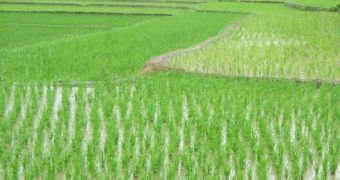A study made available to the public just yesterday argues that, as a result of climate change and of improper agricultural practices, rice production in South East Asia might soon find itself considerably affected.
Interestingly enough, the researchers who looked into this issue come from various research institutions across Germany, Vietnam, the Philippines, Thailand, UK, Bulgaria and Spain.
As one can easily guess, their interest in a potential South East Asian rice crisis stems from the fact that, seeing how this grain is next to corn in consumers' preferences, any “disturbances” in its production can lead to worldwide problems.
Food crisis aside, growing rice is also an important part of Asia's cultural heritage, which means that pushing for the preservation of this practice also aids in maintaining the cultural identity of various nations.
The aforementioned researchers explain that rice ecosystems presently have to face two major issues: first of all, there is climate change and all that it implies; secondly, there is the problem of farmer's improperly managing their crops.
Dr. Joachim Spangenberg from Germany explains, “Threats to sustainable rice production are diverse and come from different directions. Global change is a very important threat, but certainly not the only one. Human mistakes and political neglect can be even more dangerous.”
Eurek Alert reports that Dr. K. L. Heong from the Philippines also mentions, “The misuse of pesticides in rice production destroys the natural biocontrol mechanisms. Farmers are used to spray their fields, often under the advice of local pesticide retailers, at a too early stage after planting.”
In other words, pure ignorance is also to blame for a potential decline in Asia's rice production.
Moreover, the scientists involved in this study make a case of how, besides rice production, natural ecosystems nearby these plantations can also be negatively impacted on by man's being unaware of his mistakes.
Hopefully, the international LEGATO project, which aims at encouraging sustainable agricultural practices, will help with safeguarding South East Asian rice plantations by implementing ecological engineering standards.

 14 DAY TRIAL //
14 DAY TRIAL //